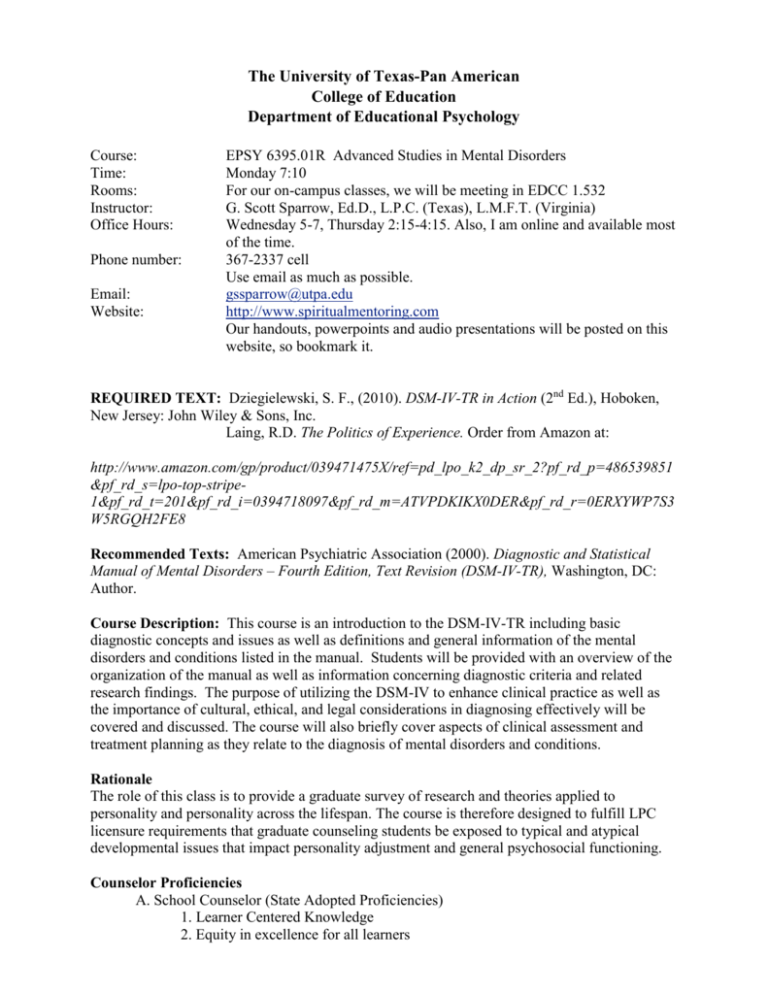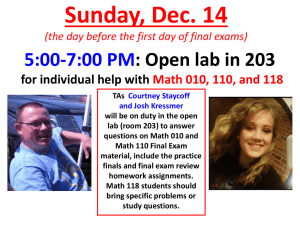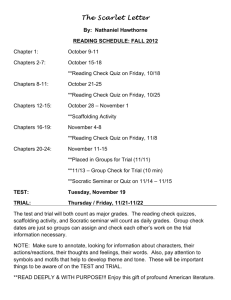Syllabus - Spiritual Mentoring
advertisement

The University of Texas-Pan American College of Education Department of Educational Psychology Course: Time: Rooms: Instructor: Office Hours: Phone number: Email: Website: EPSY 6395.01R Advanced Studies in Mental Disorders Monday 7:10 For our on-campus classes, we will be meeting in EDCC 1.532 G. Scott Sparrow, Ed.D., L.P.C. (Texas), L.M.F.T. (Virginia) Wednesday 5-7, Thursday 2:15-4:15. Also, I am online and available most of the time. 367-2337 cell Use email as much as possible. gssparrow@utpa.edu http://www.spiritualmentoring.com Our handouts, powerpoints and audio presentations will be posted on this website, so bookmark it. REQUIRED TEXT: Dziegielewski, S. F., (2010). DSM-IV-TR in Action (2nd Ed.), Hoboken, New Jersey: John Wiley & Sons, Inc. Laing, R.D. The Politics of Experience. Order from Amazon at: http://www.amazon.com/gp/product/039471475X/ref=pd_lpo_k2_dp_sr_2?pf_rd_p=486539851 &pf_rd_s=lpo-top-stripe1&pf_rd_t=201&pf_rd_i=0394718097&pf_rd_m=ATVPDKIKX0DER&pf_rd_r=0ERXYWP7S3 W5RGQH2FE8 Recommended Texts: American Psychiatric Association (2000). Diagnostic and Statistical Manual of Mental Disorders – Fourth Edition, Text Revision (DSM-IV-TR), Washington, DC: Author. Course Description: This course is an introduction to the DSM-IV-TR including basic diagnostic concepts and issues as well as definitions and general information of the mental disorders and conditions listed in the manual. Students will be provided with an overview of the organization of the manual as well as information concerning diagnostic criteria and related research findings. The purpose of utilizing the DSM-IV to enhance clinical practice as well as the importance of cultural, ethical, and legal considerations in diagnosing effectively will be covered and discussed. The course will also briefly cover aspects of clinical assessment and treatment planning as they relate to the diagnosis of mental disorders and conditions. Rationale The role of this class is to provide a graduate survey of research and theories applied to personality and personality across the lifespan. The course is therefore designed to fulfill LPC licensure requirements that graduate counseling students be exposed to typical and atypical developmental issues that impact personality adjustment and general psychosocial functioning. Counselor Proficiencies A. School Counselor (State Adopted Proficiencies) 1. Learner Centered Knowledge 2. Equity in excellence for all learners B. Professional Counselor (Academic Competencies required by Texas State Board of Professional Counselors) 1. Normal human growth & development 2. Abnormal human behavior 3. Counseling theories 4. Social, cultural, and family issues C. Marriage and Family Therapist (academic course areas required by the Texas State Board of Examiners of Marriage and Family Therapists) 1. human development 2. social/cultural/family studies 3. sexuality ExCET Competencies A. Competency 001 Human Development B. Competency 001 Environmental Influences C. Competency 003 Diversity Course Objectives: It is assumed that by adequately studying the assigned materials and by actively participating in class sessions, students will have achieved the following: Appreciate the purpose of the DSM-IV-TR Understand how to effectively diagnose when considering cultural and ethical aspects of assessment and treatment Be able to articulate how assessment, diagnosis, and treatment planning connect Be able to describe the structure and rationale of the DSM-IV multiaxial system Be able to list the general categories of mental disorders and conditions Know how to apply DSM-IV criteria in formulating a diagnosis Be familiar with current research in regards to etiology and treatment for some of the main mental disorder categories Be able to come up with appropriate diagnoses using the DSM-IV-TR for given case vignettes Course Rules -- Read Carefully! 1) Classes will start at the scheduled time, and all students are expected to arrive on time. Late arriving students may enter the class, but there will be no effort to fill them in. A sign-in sheet will be circulated at 10 minutes past the scheduled class time. 2) Class attendance is governed by the Handbook of Operating Procedures. For a more detailed description of UTPA policies on absences related to UTPA-related activities, or related to religious holidays, please refer to the HOP under Student and Student Life Policies, Section 5.2.4. For other absences, the following policy is observed in this class in accordance with the HOP: "The student is expected to attend all classes and laboratory sessions. It is the responsibility of the student to inform each instructor of absences. When, however, in the judgment of the instructor, a student has been absent to such a degree as to impair his or her status relative to credit for the course, the instructor may drop the student from the class with a grade of 'DP' or 'DF.'" Clearly, this policy leaves a lot up the professor in deciding what constitutes a level of absenteeism that is significant enough to impair your status relative to credit for this course. When it comes to this class, in particular, your attendance is crucial in order maintain the continuity of experience. If you do not think that you can attend all of the class sessions, please discuss it with me so we can determine if your intended absences will "impair" your status in this class. In any case, if you miss more than two classes, your participation with be impaired. 3) All assignments need to be typed. 4) Assignments that are turned in late will be penalized by a letter grade. 5) Without exception, cell phones must be turned off for the duration of the class unless you must monitor a crisis situation. No text messaging during class! Short breaks will allow you to touch base with home and work, as needed. Accommodations If you have a documented disability that will make it difficult for you to carry out the work that I have outlined, and/or you need special assistance or accommodations due to your disability, please contact the Office of Services for Persons with Disabilities. Appropriate help will be arranged. Meeting Structure Half of the course will consist of classroom meetings, and half will consist of online activities. The first two classes will be on campus, and then we will meet every other week, while we will be doing online work in between in-class meetings. Classroom meetings. The sole purpose of the classroom meetings will be to provide a seminar setting for the discussion of essential case scenarios and interventional strategies. During this time, 1) We will discuss the material that you have read and been tested on the previous week, and review other materials relevant to our study. 2) You will need to bring one question to each of our classes, based on the text reading. We will address your questions, and brainstorm diagnostic and treatment scenarios that arise in the course of our discussions. We will review your online assignments. 3) Online work. Each week of online work will consist of 1) 2) 3) Complete online discussion board assignments related to diagnosing narrative descriptions of clients in distress. You will do these assignments in small groups of 3 students each. Providing peer review of the assignments. The members of each group will be individually responsible for providing peer review for one of the other groups. Taking a quiz over chapters and class work. You will be able to take each quiz twice, and the highest score will be recorded in your grade book. Grade Breakdown 2) Seven quizzes over the Text chapters –– 100 apiece or 700 points total –– Each online quiz will involve 15-20 multiple choice or short answer questions over text, discussions, and handouts. 3) 20 Discussion Board Diagnostic assignments –– You will post as a groupn, and receive the same grade individually, worth 20 pts. apiece, for a total of 400 point 4) Research Paper with Round Robin presentation (15 minutes) – 200 points Each student will prepare a brief research paper focusing on a topic in the area of mental health diagnostics. No two students will be able to write on the same topic. The topic must be approved by the professor. Each student will present a brief summary of his or her paper during the last two class meetings Papers must be written using APA style (5th or 6th edition), and must include a minimum of 5 sources. One can be the DSM text book. The other sources must be original, research articles, or books. The paper is to be a minimum of 5 pages and maximum of 10 pages of text (not including title page or references). Your grade will be determined by the total points that you earn. The points required for grades are as follows: Total Points -- 1500 A – 1350-1500 B—1200-1299 C –1050-1199 ______________________________________________ Schedule of Meetings and Assignments 1/19/11 Orientation Read 1-2 1/24/11 In-class discussion of Chapters 1-2 Take Online quiz over 1-2 Read Chapters 3-4 1/31/11 In-class discussion of Chapters 3-4 Take Chapter 3-4 quiz online Read Chapters 5-6 2/7/11 In-class discussion of Chapter 5-6 Video 2/14/11 Online work Take Chapter 5-6 quiz online Do online assignments. Read Chapters 7-8 2/21/11 In-class discussion of Chapter 7-8 Video 2/28/11 Online work Take Chapter 7-8 quiz online Do online assignments. Read Chapters 9-10 3/7/11 In-class discussion of Chapter 9-10 3/14/11 Spring Break 3/28/11 Online work Read Chapters 11-12 Take Chapter 11-12 quiz online Do online assignments. 4/4/11 In-class discussion of Chapters 11-12 Taped interview of “Brigette”—Diagnostic exercise 4/11/11 Online work Read Chapters 13 Take Chapter 13 quiz online Do online assignments. 4/18/11 Seminar discussion of Chapter 13 Taped interview of “David” ”—Diagnostic exercise 4/25/11 Round Robin paper presentations 5/2/11 Papers Due Round Robin paper presentations continued Meal together






